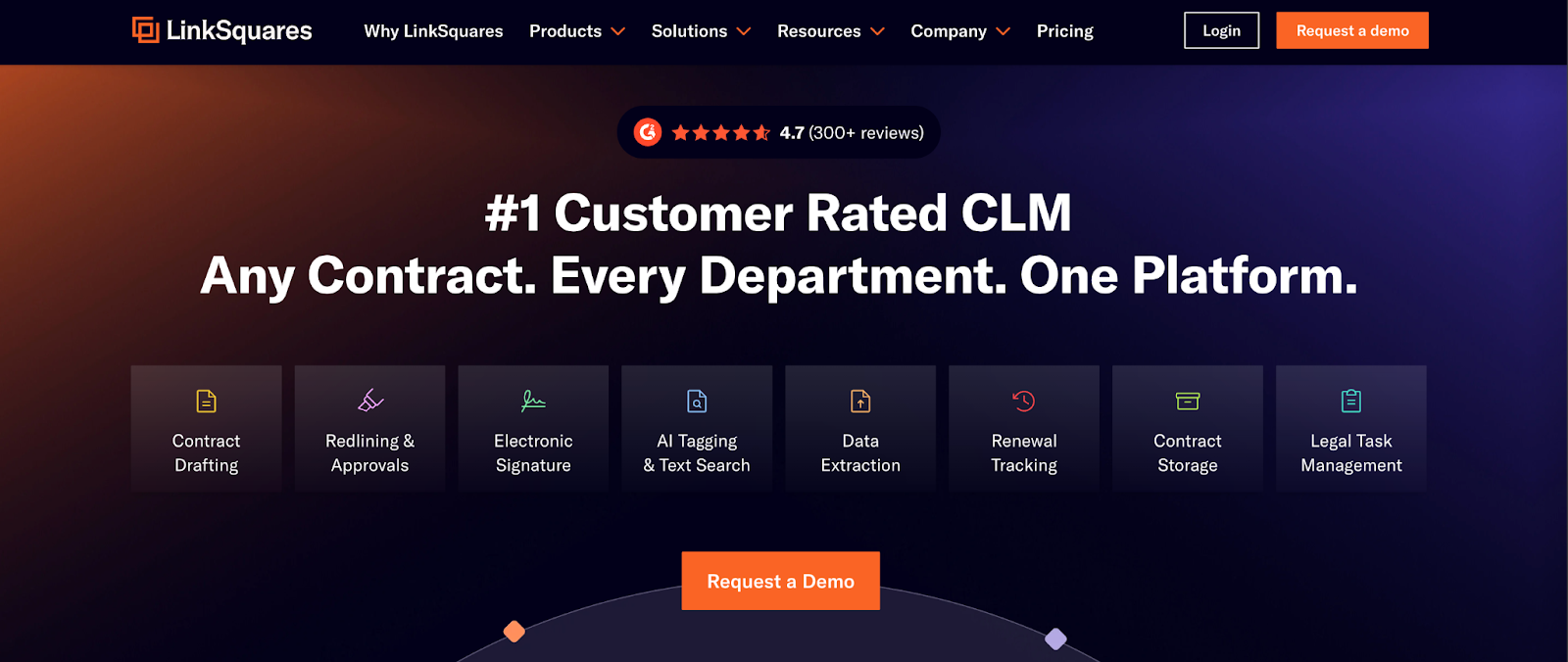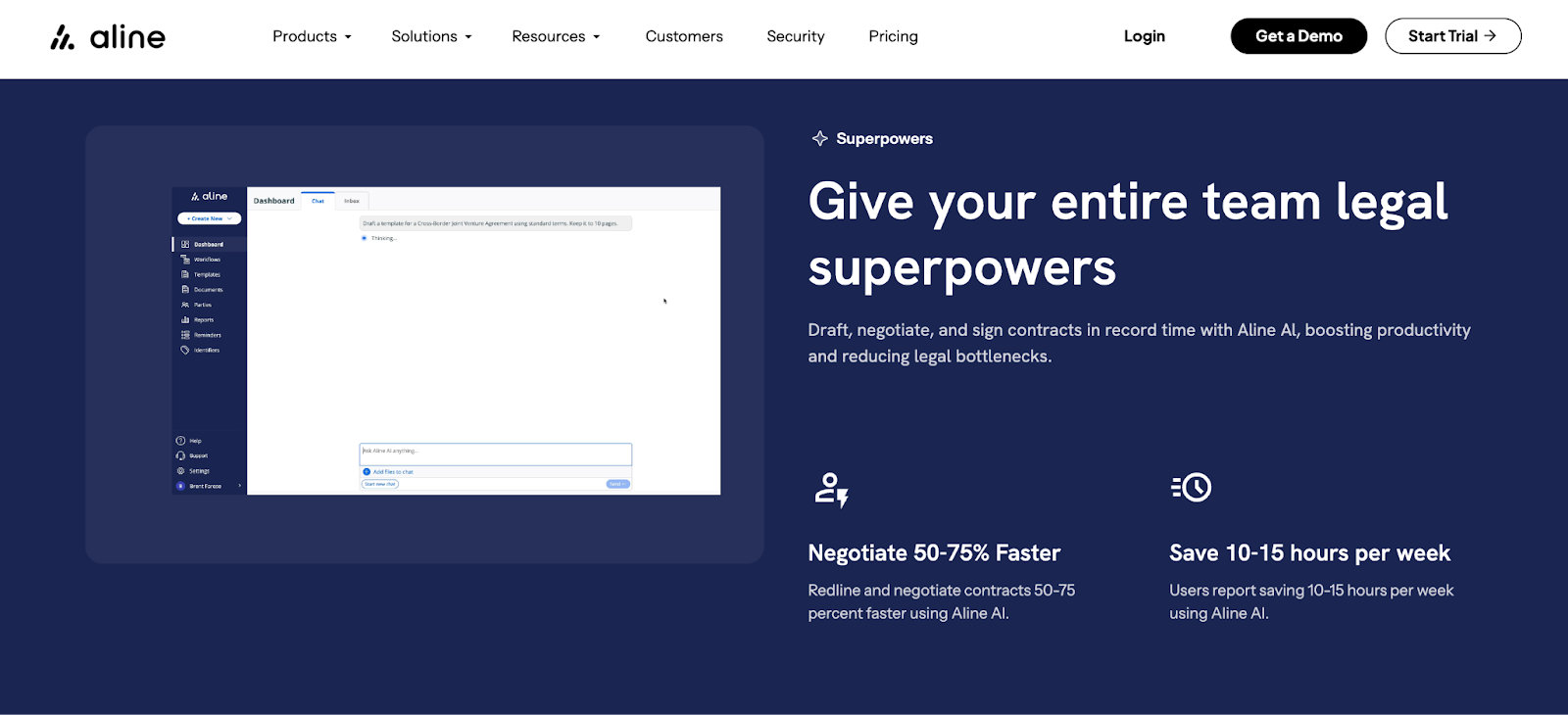The contract management software market can feel crowded, but a few names constantly rise to the top. Ironclad and LinkSquares are two of them.
Both have built strong reputations for helping teams handle contracts more efficiently, yet they do it in very different ways.
If you’re trying to decide which platform fits your team best, this comparison breaks down how Ironclad, LinkSquares, and Aline handle the contracting process, what makes each one different, and where they shine most.

Ironclad has built a good reputation as one of the most recognizable names in contract management software. It’s often the first platform that comes up when legal teams start looking for a more organized way to handle the contracting process.
What draws many Ironclad users in is its focus on structure and control. The platform was built to help companies move beyond scattered tools and spreadsheets by managing all your contracts in one place.
Over the years, it’s become known for its professional polish, extensive resources, and an active user community that shares workflow ideas and best practices.
Ironclad also partners with large organizations that handle high contract volume, which adds to its credibility. It’s seen as a reliable system for teams that value oversight and documentation in every contract phase.
While the setup can be complex for smaller teams, many larger legal departments appreciate how much governance and consistency it brings.

LinkSquares is a contract management platform built to help businesses understand and control the entire contract lifecycle. It’s best known for LinkSquares AI, which analyzes contracts to pull out key data points, obligations, and renewal terms automatically.
The platform originally gained attention for its post-signature insights, helping legal teams make sense of existing agreements. It then evolved into a full contract lifecycle management system that supports creation, collaboration, and analytics within one connected space.
LinkSquares focuses heavily on visibility. It gives teams a clear view of what’s inside their contracts so they can make faster decisions, stay compliant, and avoid costly surprises down the line.
Its AI-driven summaries and reporting tools also appeal to finance and operations teams that rely on accurate data to plan and forecast.
While LinkSquares AI is powerful, the platform leans more toward legal analytics and tracking than day-to-day drafting or collaboration.
Still, it has built a solid reputation among companies that want a reliable way to understand what’s hidden in their contracts and use that insight to improve how they manage every stage of the lifecycle.

Aline is an AI-powered platform built for complete contract lifecycle management, giving teams one place to create, review, sign, and track every agreement.
Unlike traditional tools that only cover one part of the process, Aline manages the entire contract lifecycle from the first draft to the final signature and post-signature analysis.
Its biggest strength lies in AI accuracy. Aline’s smart drafting and redlining features help users catch risky language, apply approved clauses, and generate contracts in minutes.
The platform’s AI legal assistant also summarizes agreements, flags obligations, and learns from your past edits to make future reviews faster and more precise.
Everything happens in one intuitive workspace, so legal, sales, and operations teams can collaborate without switching tools or losing track of version history. Built-in e-signatures, smart workflows, and detailed reporting make it easy to keep contracts moving.
Aline is designed for teams that want powerful automation and real results without a long setup or complex learning curve.
Book a demo to see how Aline can simplify your entire contract lifecycle.
All three platforms aim to simplify contract work, yet each one takes its own approach to automation, collaboration, and control. Let's compare each tool:
Ironclad, LinkSquares, and Aline were all built to improve the contract management process, but they focus on different stages and priorities.
Ironclad emphasizes structure and control to give large organizations the ability to manage contracts with custom workflows and deep visibility. It’s a system that handles high volume with precision, though its setup can feel complex for smaller teams.
Plus, the user interface is professional and detailed, built for legal teams that want oversight across every stage.
On the other hand, LinkSquares leans on artificial intelligence to help companies understand what’s inside their agreements. It’s especially useful after signing, as it turns contract data into reports that highlight obligations, renewals, and risks.
For teams that already have processes in place but need better visibility, LinkSquares acts as a reliable hub in a centralized location.
Aline brings everything together in one single platform that covers contract drafting, collaboration, signing, and reporting. It’s best for teams that want modern automation without the technical complexity.
What's more, Aline’s clean user interface makes contract work faster, easier, and more accurate. This way, every department has real-time access to the data they need to keep deals moving.
Each platform tackles legal workflow automation and visibility in its own way. Comparing them helps you understand which system truly supports how your team works:
If you want to know more, here's an overview of Aline.
Ironclad stands out among larger organizations that want tight control and detailed oversight. It’s suitable for legal and internal teams handling high contract volume across multiple departments.
And because it’s a highly customizable CLM solution, it fits companies that have the time and resources to build specific workflows. However, that flexibility can mean more setup and manual work than some teams prefer.
LinkSquares tends to fit teams that already have contracts in place and want to understand them better. Its analytics make it easy for business users to see what’s inside their documents without digging through each one manually.
It’s helpful for finance, operations, and procurement teams that care more about insights than editing.
Aline, on the other hand, feels like it was made for teams that want to close deals faster. It brings every department into one simple workspace where automation takes care of repetitive steps and AI contract reviews every contract phase with precision.
All in all, it’s a CLM solution built for growing companies that want powerful automation without the complexity.
Pricing for contract management tools can vary widely, especially since each platform targets different types of teams and contract volumes. Here are pricing details for each tool on our list:
Ironclad does not list its pricing publicly. Plans are customized based on company size, contract volume, and implementation needs. Because the platform is designed for larger organizations, the cost usually includes onboarding and long-term configuration support.
LinkSquares also offers custom pricing. The final cost depends on the number of users, contract volume, and which modules you need, such as contract analysis, drafting, or full lifecycle management.
Aline provides transparent pricing that’s easy to understand.
View Aline’s full pricing details to find the right fit for your team.
Choosing between Ironclad, LinkSquares, and Aline really comes down to what matters most to your team.
Maybe you’re tired of how long it takes to move a contract from draft to signature. Or maybe you just want one place where everyone can see what’s going on without hunting through endless folders.
Ironclad offers structure and customization, which can be great if your company has the resources to manage it. LinkSquares gives you deep visibility into what’s already signed so you can stay on top of obligations and renewals.
But if you’re looking for something that feels easy to use while still covering the entire lifecycle of your contracts, Aline is your best option.

It’s built to simplify the way teams actually work. If you want to save time, stay organized, and keep every department on the same page, Aline absolutely delivers what you’ve been missing.
Yes, Ironclad is a legitimate and widely used contract management platform trusted by thousands of customers across industries. Many legal and sales teams rely on it to manage and track their contracts efficiently. It’s particularly known for helping larger organizations create structured approval workflows and maintain compliance.
Ironclad is focused on workflow automation and collaboration during the contracting process, while DocuSign CLM builds on its well-known e-signature tools to manage agreements after signing. If you already use DocuSign for signatures, integrating CLM feels natural. But for end-to-end contract management, Ironclad offers more options for tracking and automation.
Both are enterprise-level CLM solutions, but they differ in focus. Ironclad emphasizes usability and collaboration across departments, while Icertis targets highly regulated industries with more complex compliance needs. The choice often comes down to whether your team values flexibility or detailed governance controls.
Ironclad doesn’t publish public pricing. Costs depend on user count, workflow complexity, and the number of contracts your team manages. Most companies go through a thorough review with the sales and support team to get a quote that fits their needs.
Yes, LinkSquares can be a strong Ironclad alternative for teams focused on contract analytics and reporting. While Ironclad is built for collaboration and automation, LinkSquares leans more toward post-signature visibility. Both platforms help store contracts, track renewals, and keep agreement data accessible to legal and finance teams.
That depends on your priorities. Ironclad and LinkSquares serve different needs. Ironclad focuses on drafting, collaboration, and workflow control, while LinkSquares specializes in analysis and post-signature tracking. If you want a balance of automation, reporting, and simple contract creation, Aline brings all of it together in one intuitive system that’s truly a game changer for teams looking to simplify contract management.

